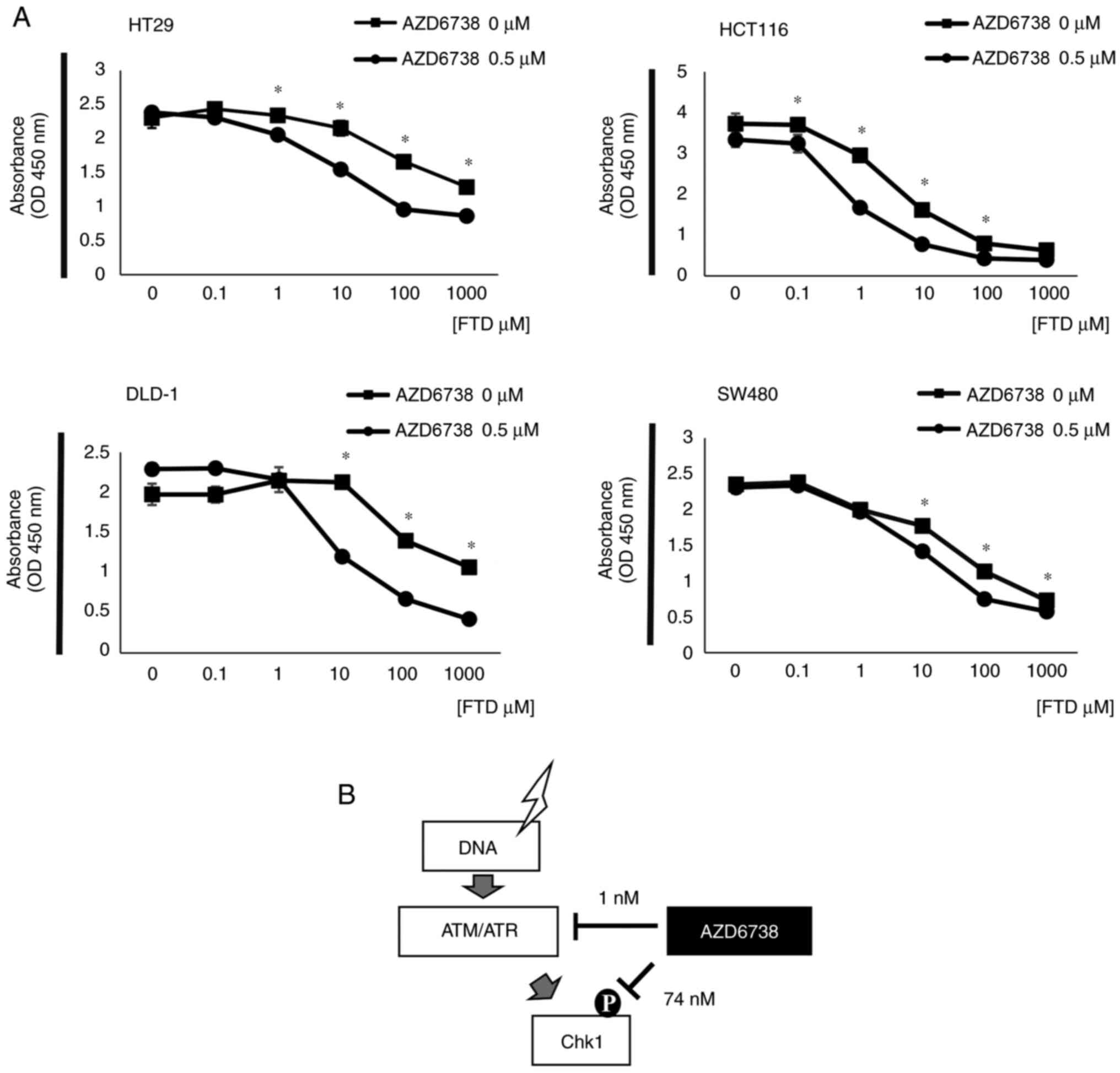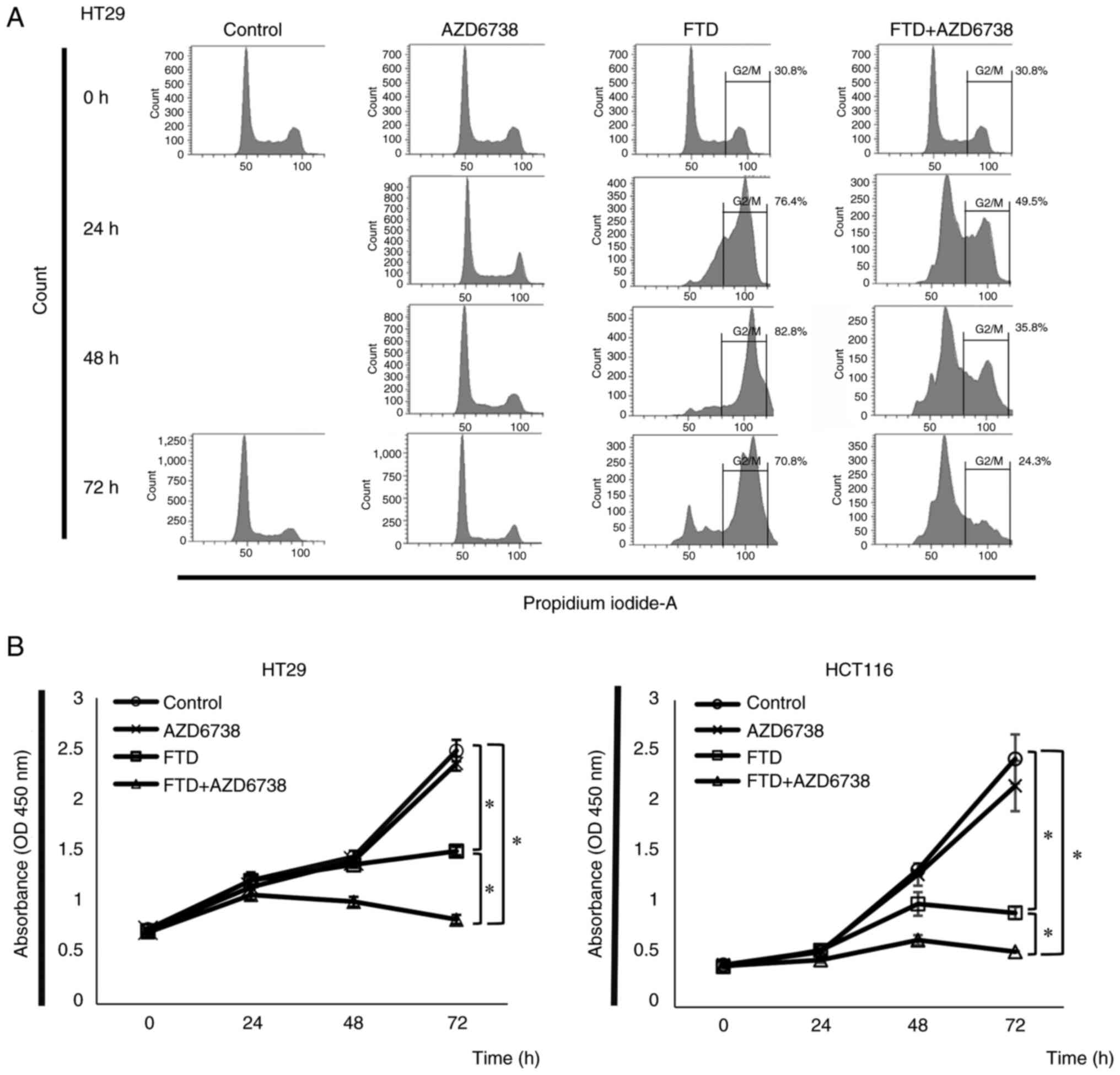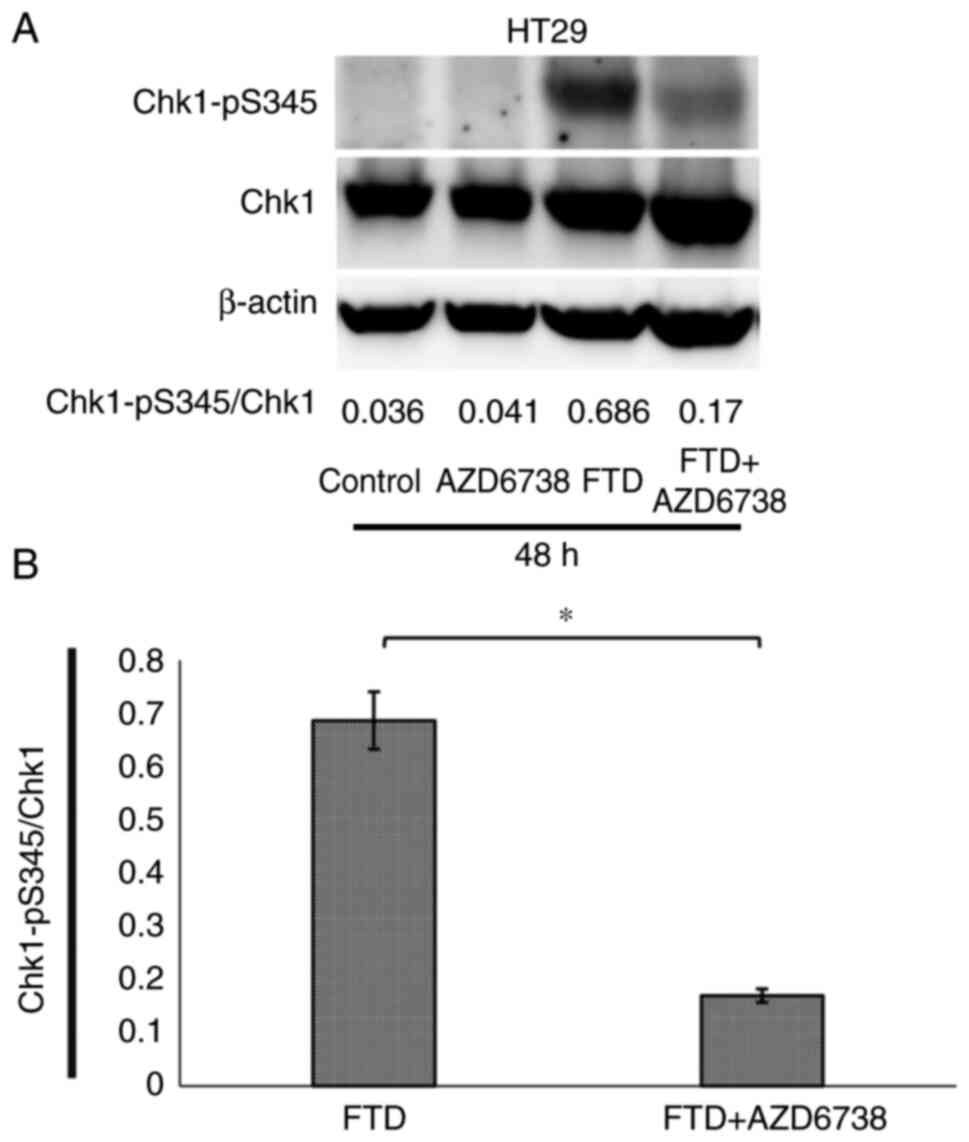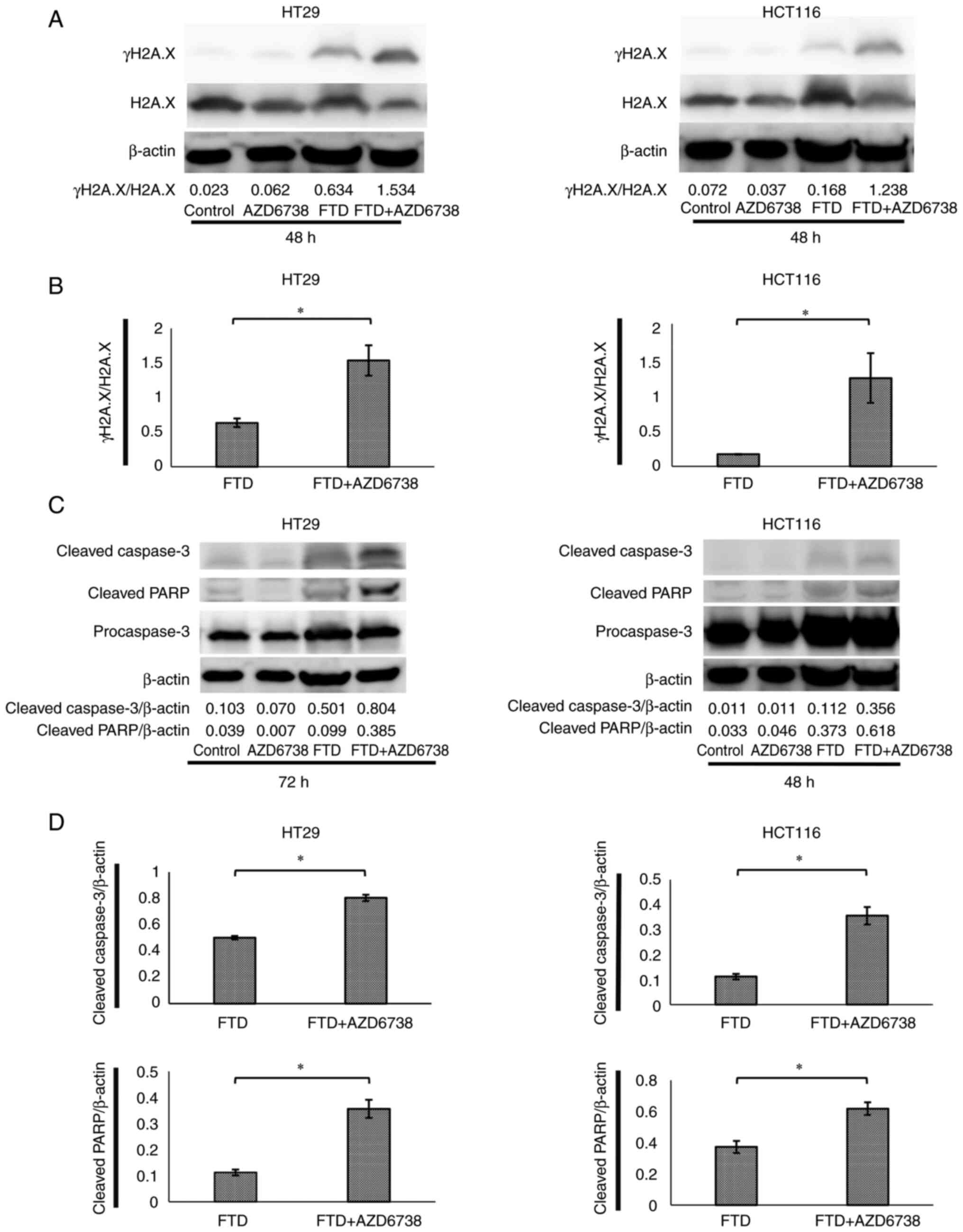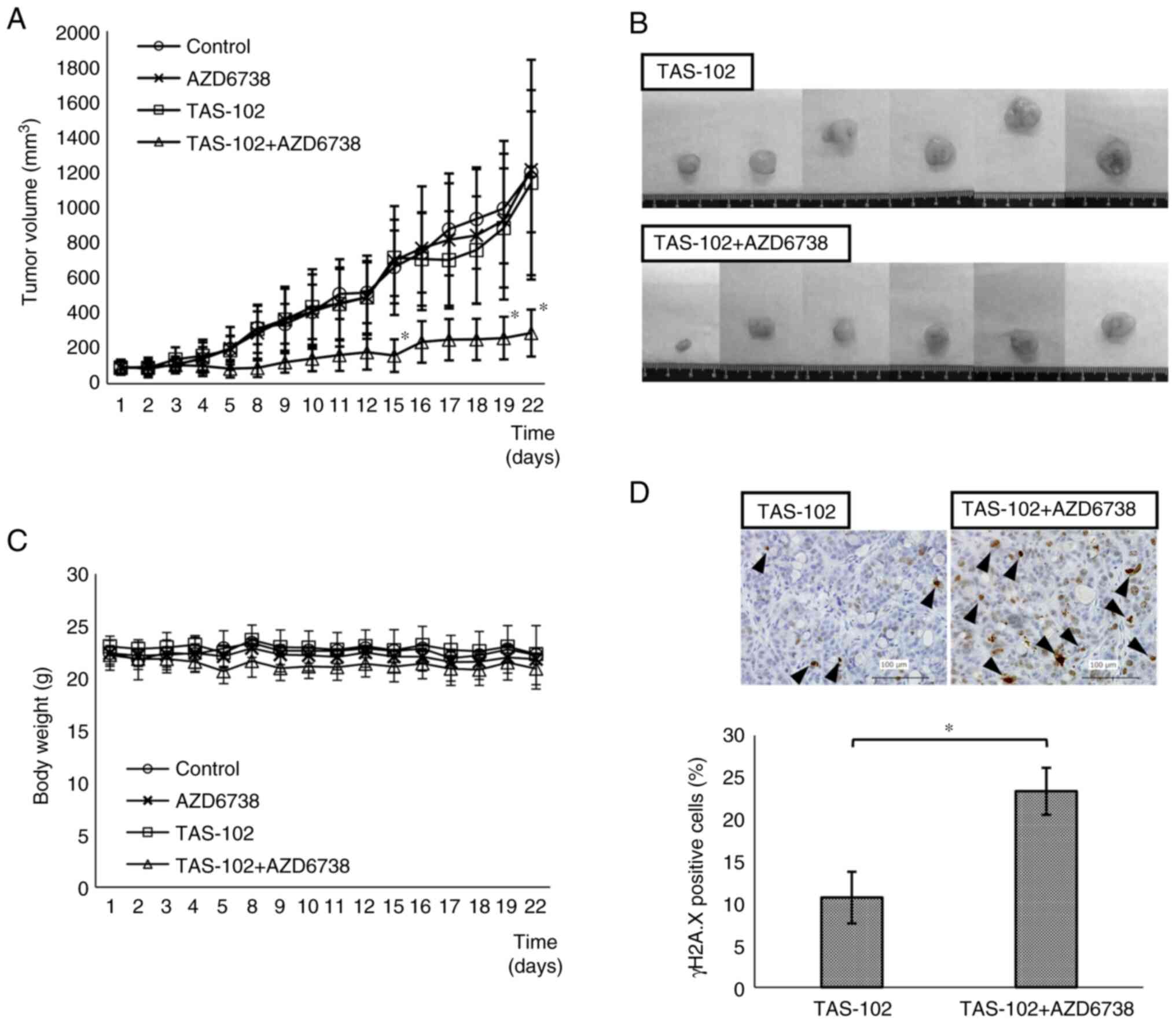|
1
|
Yoshino T, Oki E, Nozawa H,
Eguchi-Nakajima T, Taniguchi H, Morita S, Takenaka N, Ozawa D and
Shirao K: Rationale and design of the TRUSTY study: A randomised,
multicentre, open-label phase II/III study of
trifluridine/tipiracil plus bevacizumab versus irinotecan,
fluoropyrimidine plus bevacizumab as second-line treatment in
patients with metastatic colorectal cancer progressive during or
following first-line oxaliplatin-based chemotherapy. ESMO Open.
3:e0004112018. View Article : Google Scholar : PubMed/NCBI
|
|
2
|
Hirokawa T, Shiotani B, Shimada M, Murata
K, Johmura Y, Haruta M, Tahara H, Takeyama H and Nakanishi M:
CBP-93872 inhibits NBS1-mediated ATR activation, abrogating
maintenance of the DNA double-strand break-specific G2 checkpoint.
Cancer Res. 74:3880–3889. 2014. View Article : Google Scholar : PubMed/NCBI
|
|
3
|
Harper JW and Elledge SJ: The DNA damage
response: Ten years after. Mol Cell. 28:739–745. 2007. View Article : Google Scholar : PubMed/NCBI
|
|
4
|
Foote KM, Nissink JWM, McGuire T, Turner
P, Guichard S, Yates JWT, Lau A, Blades K, Heathcote D, Odedra R,
et al: Discovery and characterization of AZD6738, a potent
inhibitor of ataxia telangiectasia mutated and Rad3 related (ATR)
kinase with application as an anticancer agent. J Med Chem.
61:9889–9907. 2018. View Article : Google Scholar : PubMed/NCBI
|
|
5
|
Bradbury A, Hall S, Curtin N and Drew Y:
Targeting ATR as cancer therapy: A new era for synthetic lethality
and synergistic combinations? Pharmacol Ther. 207:1074502020.
View Article : Google Scholar : PubMed/NCBI
|
|
6
|
Yap TA, Tan DSP, Terbuch A, Caldwell R,
Guo C, Goh BC, Heong V, Haris NRM, Bashir S, Drew Y, et al:
First-in-human trial of the oral ataxia telangiectasia and
RAD3-related (ATR) inhibitor BAY 1895344 in patients with advanced
solid tumors. Cancer Discov. 11:80–91. 2021. View Article : Google Scholar : PubMed/NCBI
|
|
7
|
Yap TA, O'Carrigan B, Penney MS, Lim JS,
Brown JS, de Miguel Luken MJ, Tunariu N, Perez-Lopez R, Rodrigues
DN, Riisnaes R, et al: Phase I trial of first-in-class ATR
inhibitor M6620 (VX-970) as monotherapy or in combination with
carboplatin in patients with advanced solid tumors. J Clin Oncol.
38:3195–3204. 2020. View Article : Google Scholar : PubMed/NCBI
|
|
8
|
Kwok M, Davies N, Agathanggelou A, Smith
E, Petermann E, Yates E, Brown J, Lau A and Stankovic T: Synthetic
lethality in chronic lymphocytic leukaemia with DNA damage response
defects by targeting the ATR pathway. Lancet. 385 (Suppl
1):S582015. View Article : Google Scholar : PubMed/NCBI
|
|
9
|
Yap TA, Krebs MG, Postel-Vinay S,
El-Khouiery A, Soria JC, Lopez J, Berges A, Cheung SYA,
Irurzun-Arana I, Goldwin A, et al: Ceralasertib (AZD6738), an oral
ATR kinase inhibitor, in combination with carboplatin in patients
with advanced solid tumors: A phase I study. Clin Cancer Res.
27:5213–5224. 2021. View Article : Google Scholar : PubMed/NCBI
|
|
10
|
Wallez Y, Dunlop CR, Johnson TI, Koh SB,
Fornari C, Yates JWT, Bernaldo de Quirós Fernández S, Lau A,
Richards FM and Jodrell DI: The ATR inhibitor AZD6738 synergizes
with gemcitabine in vitro and in vivo to induce pancreatic ductal
adenocarcinoma regression. Mol Cancer Ther. 17:1670–1682. 2018.
View Article : Google Scholar : PubMed/NCBI
|
|
11
|
Sheng H, Huang Y, Xiao Y, Zhu Z, Shen M,
Zhou P, Guo Z, Wang J, Wang H, Dai W, et al: ATR inhibitor AZD6738
enhances the antitumor activity of radiotherapy and immune
checkpoint inhibitors by potentiating the tumor immune
microenvironment in hepatocellular carcinoma. J Immunother Cancer.
8:e0003402020. View Article : Google Scholar : PubMed/NCBI
|
|
12
|
Nam AR, Jin MH, Park JE, Bang JH, Oh DY
and Bang YJ: Therapeutic targeting of the DNA damage response using
an ATR inhibitor in biliary tract cancer. Cancer Res Treat.
51:1167–1179. 2019. View Article : Google Scholar : PubMed/NCBI
|
|
13
|
Min A, Im SA, Jang H, Kim S, Lee M, Kim
DK, Yang Y, Kim HJ, Lee KH, Kim JW, et al: AZD6738, a novel oral
inhibitor of ATR, induces synthetic lethality with ATM deficiency
in gastric cancer cells. Mol Cancer Ther. 16:566–577. 2017.
View Article : Google Scholar : PubMed/NCBI
|
|
14
|
Smith J, Tho LM, Xu N and Gillespie DA:
The ATM-Chk2 and ATR-Chk1 pathways in DNA damage signaling and
cancer. Adv Cancer Res. 108:73–112. 2010. View Article : Google Scholar : PubMed/NCBI
|
|
15
|
Toczyski DP, Galgoczy DJ and Hartwell LH:
CDC5 and CKII control adaptation to the yeast DNA damage
checkpoint. Cell. 90:1097–1106. 1997. View Article : Google Scholar : PubMed/NCBI
|
|
16
|
Fan S, Smith ML, Rivet DJ II, Duba D, Zhan
Q, Kohn KW, Fornace AJ Jr and O'Connor PM: Disruption of p53
function sensitizes breast cancer MCF-7 cells to cisplatin and
pentoxifylline. Cancer Res. 55:1649–1654. 1995.PubMed/NCBI
|
|
17
|
Reaper PM, Griffiths MR, Long JM, Charrier
JD, Maccormick S, Charlton PA, Golec JM and Pollard JR: Selective
killing of ATM-or p53-deficient cancer cells through inhibition of
ATR. Nat Chem Biol. 7:428–430. 2011. View Article : Google Scholar : PubMed/NCBI
|
|
18
|
Pabla N, Huang S, Mi QS, Daniel R and Dong
Z: ATR-Chk2 signaling in p53 activation and DNA damage response
during cisplatin-induced apoptosis. J Biol Chem. 283:6572–6583.
2008. View Article : Google Scholar : PubMed/NCBI
|
|
19
|
Iacopetta B: TP53 mutation in colorectal
cancer. Hum Mutat. 21:271–276. 2003. View Article : Google Scholar : PubMed/NCBI
|
|
20
|
Suzuki T, Hirokawa T, Maeda A, Harata S,
Watanabe K, Yanagita T, Ushigome H, Nakai N, Maeda Y, Shiga K, et
al: ATR inhibitor AZD6738 increases the sensitivity of colorectal
cancer cells to 5-fluorouracil by inhibiting repair of DNA damage.
Oncol Rep. 47:782022. View Article : Google Scholar : PubMed/NCBI
|
|
21
|
Matsuoka K, Iimori M, Niimi S, Tsukihara
H, Watanabe S, Kiyonari S, Kiniwa M, Ando K, Tokunaga E, Saeki H,
et al: Trifluridine induces p53-dependent sustained G2 phase arrest
with its massive misincorporation into DNA and Few DNA strand
breaks. Mol Cancer Ther. 14:1004–1013. 2015. View Article : Google Scholar : PubMed/NCBI
|
|
22
|
Tanaka N, Sakamoto K, Okabe H, Fujioka A,
Yamamura K, Nakagawa F, Nagase H, Yokogawa T, Oguchi K, Ishida K,
et al: Repeated oral dosing of TAS-102 confers high trifluridine
incorporation into DNA and sustained antitumor activity in mouse
models. Oncol Rep. 32:2319–2326. 2014. View Article : Google Scholar : PubMed/NCBI
|
|
23
|
Ohashi S, Kikuchi O, Nakai Y, Ida T, Saito
T, Kondo Y, Yamamoto Y, Mitani Y, Nguyen Vu TH, Fukuyama K, et al:
Synthetic lethality with trifluridine/tipiracil and checkpoint
kinase 1 inhibitor for esophageal squamous cell carcinoma. Mol
Cancer Ther. 19:1363–1372. 2020. View Article : Google Scholar : PubMed/NCBI
|
|
24
|
Mayer RJ, Van Cutsem E, Falcone A, Yoshino
T, Garcia-Carbonero R, Mizunuma N, Yamazaki K, Shimada Y, Tabernero
J, Komatsu Y, et al: Randomized trial of TAS-102 for refractory
metastatic colorectal cancer. N Engl J Med. 372:1909–1919. 2015.
View Article : Google Scholar : PubMed/NCBI
|
|
25
|
Chou TC and Talalay P: Quantitative
analysis of dose-effect relationships: The combined effects of
multiple drugs or enzyme inhibitors. Adv Enzyme Regul. 22:27–55.
1984. View Article : Google Scholar : PubMed/NCBI
|
|
26
|
Fukushima M, Suzuki N, Emura T, Yano S,
Kazuno H, Tada Y, Yamada Y and Asao T: Structure and activity of
specific inhibitors of thymidine phosphorylase to potentiate the
function of antitumor 2′-deoxyribonucleosides. Biochem Pharmacol.
59:1227–1236. 2000. View Article : Google Scholar : PubMed/NCBI
|
|
27
|
Emura T, Suzuki N, Fujioka A, Ohshimo H
and Fukushima M: Potentiation of the antitumor activity of alpha,
alpha, alpha-trifluorothymidine by the co-administration of an
inhibitor of thymidine phosphorylase at a suitable molar ratio
in vivo. Int J Oncol. 27:449–455. 2005.PubMed/NCBI
|
|
28
|
Iwata T, Uchino T, Koyama A, Johmura Y,
Koyama K, Saito T, Ishiguro S, Arikawa T, Komatsu S, Miyachi M, et
al: The G2 checkpoint inhibitor CBP-93872 increases the sensitivity
of colorectal and pancreatic cancer cells to chemotherapy. PLoS
One. 12:e01782212017. View Article : Google Scholar : PubMed/NCBI
|
|
29
|
Emura T, Suzuki N, Yamaguchi M, Ohshimo H
and Fukushima M: A novel combination antimetabolite, TAS-102,
exhibits antitumor activity in FU-resistant human cancer cells
through a mechanism involving FTD incorporation in DNA. Int J
Oncol. 25:571–578. 2004.PubMed/NCBI
|
|
30
|
Vendetti FP, Lau A, Schamus S, Conrads TP,
O'Connor MJ and Bakkenist CJ: The orally active and bioavailable
ATR kinase inhibitor AZD6738 potentiates the anti-tumor effects of
cisplatin to resolve ATM-deficient non-small cell lung cancer in
vivo. Oncotarget. 6:44289–44305. 2015. View Article : Google Scholar : PubMed/NCBI
|
|
31
|
Checkley S, MacCallum L, Yates J, Jasper
P, Luo H, Tolsma J and Bendtsen C: Bridging the gap between in
vitro and in vivo: Dose and schedule predictions for the ATR
inhibitor AZD6738. Sci Rep. 5:135452015. View Article : Google Scholar : PubMed/NCBI
|
|
32
|
Dillon MT, Barker HE, Pedersen M, Hafsi H,
Bhide SA, Newbold KL, Nutting CM, McLaughlin M and Harrington KJ:
Radiosensitization by the ATR inhibitor AZD6738 through generation
of acentric micronuclei. Mol Cancer Ther. 16:25–34. 2017.
View Article : Google Scholar : PubMed/NCBI
|
|
33
|
Kataoka Y, Iimori M, Niimi S, Tsukihara H,
Wakasa T, Saeki H, Oki E, Maehara Y and Kitao H: Cytotoxicity of
trifluridine correlates with the thymidine kinase 1 expression
level. Sci Rep. 9:79642019. View Article : Google Scholar : PubMed/NCBI
|
|
34
|
Rothkamm K, Christiansen S, Rieckmann T,
Horn M, Frenzel T, Brinker A, Schumacher U, Stein A, Petersen C and
Burdak-Rothkamm S: Radiosensitisation and enhanced tumour growth
delay of colorectal cancer cells by sustained treatment with
trifluridine/tipiracil and X-rays. Cancer Lett. 493:179–188. 2020.
View Article : Google Scholar : PubMed/NCBI
|
|
35
|
Wilson Z, Odedra R, Wallez Y, Wijnhoven
PWG, Hughes AM, Gerrard J, Jones GN, Bargh-Dawson H, Brown E, Young
LA, et al: ATR inhibitor AZD6738 (Ceralasertib) exerts antitumor
activity as a monotherapy and in combination with chemotherapy and
the PARP inhibitor olaparib. Cancer Res. 82:1140–1152. 2022.
View Article : Google Scholar : PubMed/NCBI
|
|
36
|
Goto H, Izawa I, Li P and Inagaki M: Novel
regulation of checkpoint kinase 1: Is checkpoint kinase 1 a good
candidate for anti-cancer therapy? Cancer Sci. 103:1195–1200. 2012.
View Article : Google Scholar : PubMed/NCBI
|
|
37
|
Bernabe-Ramirez C, Patel R, Chahal J and
Saif MW: Treatment options in BRAF-mutant metastatic colorectal
cancer. Anticancer Drugs. 31:545–557. 2020. View Article : Google Scholar : PubMed/NCBI
|















